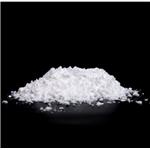free flowing powder(s); trig; specific heat 1.32kJ/(kg ·K); enthalpy of formation ?4784.4MJ/ mol; used as a weed killer, and to control fungus growth on citrus fruit [KIR78]
Hexagonal crystal; density 1.88 g/cm3; decomposes on heating; reversibly converts to an amorphous dihydrate when heated at 88°C at 2 torr; soluble in water (13% at 45°C), soluble in alcohols (17% in methanol and 31% in ethylene glycol by weight).
Borax pentahydrate occurs in nature as mineral tincalconite, formed by dehydration of borax. It has several industrial applications, mostly the same as its decahydrate. The pentahydrate is used in the manufacture of borosilicate glass. It also is used in cleaning agents; ceramic glaze; adhesives; cosmetics; antifreeze; and herbicide formulations. It is added to fertilizers to provide boron as a nutrient to the plants.
Borax pentahydrate is produced from various sodium borate and magnesium borate ores. In the United States, it is produced from dry lake brines, colemanite and tincal. It is commercially produced along with the decahydrate. The production processes are similar to decahydrate (see Borax decahydrate).
